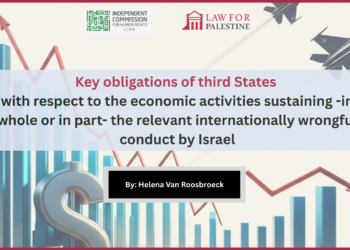Law for Palestine Hosts Expert Webinar on ICJ Advisory Opinion: Enforcing Accountability, Challenging Apartheid, and Unseating Israel from the UNGA
On 17th December 2024, Law for Palestine, in collaboration with the Independent Commission for Human Rights – Palestine (ICHR), hosted an online webinar via Zoom, which was also streamed live on YouTube. The event marked the opening of the third season of the Jurists for Palestine Forum, titled, “The ICJ Advisory Opinion on Israel in Action: Enforcing State Accountability, Reconstituting Apartheid Frameworks, and Unseating from the UNGA.”
The webinar explored the legal implications of the International Court of Justice’s (ICJ) determination on the illegality of Israel’s occupation of Palestine, and examined actionable strategies for accountability and justice. It discussed the legal obligations of third-party states to end complicity in Israel’s occupation and apartheid, the application of international law in defining apartheid, mechanisms for holding Israel accountable, and practical steps for implementing the ICJ advisory opinion, including the possibility of unseating Israel from the UNGA.
Moderated by Shahd Hammouri (Lecturer in Law at Kent University and Senior Advisor at Law for Palestine), the event featured three distinguished experts: Victor Kattan (Assistant Professor of Public International Law at the University of Nottingham and Deputy Director of the Nottingham International Law and Security Centre), Maryam Jamshidi (Associate Professor of Law at the University of Colorado Law School), and Jinan Bastaki (Associate Professor of Legal Studies at New York University Abu Dhabi).
Shahd Hammouri: The ICJ Ruling and the Call for Collective Action to Enforce Accountability
In her opening remarks, Shahd Hammouri highlighted the historical significance of the ICJ’s recent ruling on the illegality of Israel’s prolonged occupation of Palestinian territory. She emphasised that this long-awaited decision reaffirms Israel’s violations of jus cogens norms, including the Palestinian people’s right to self-determination, as well as prohibitions against aggression, racial discrimination, and apartheid.
Hammouri underscored the critical moment this ruling represents for both the Palestinian struggle and the international legal system, which is now facing a test of its commitment to justice and enforceability. She called for collective efforts from civil society, activists, and advocates to transform this landmark decision into tangible actions, overcoming political obstacles and amplifying the voice of justice. She concluded her remarks by introducing the esteemed panel of experts who would address the legal implications, accountability frameworks, and strategies for dismantling apartheid and unlawful occupation.
Victor Kattan: Apartheid as a Crime Against Humanity – Legal Frameworks and the Need for Sanctions
During the webinar, Dr Victor Kattan provided an in-depth analysis of apartheid under international law and its application to Israeli policies. He began by defining apartheid as a crime against humanity, characterised by systemic oppression, domination, and inhumane acts committed by one racial group against another.
Dr Kattan examined the legal frameworks addressing apartheid, including the 1973 Apartheid Convention and the Rome Statute, emphasising their relevance to the International Criminal Court’s investigation into alleged Israeli apartheid. He referred to the ICJ’s advisory opinion, which identified Israel’s systemic discrimination against Palestinians as a violation of international obligations under racial discrimination conventions.
Kattan stressed the importance of reinstating permanent, targeted bodies like the Anti-Apartheid Committee, which supported arms embargoes, trade sanctions, and civil society monitoring
Drawing from historical anti-apartheid mechanisms, such as the UN’s Anti-Apartheid Committee, Dr Kattan discussed their potential adaptation to the Palestinian context. He stressed the importance of reinstating permanent, targeted bodies like the Anti-Apartheid Committee, which supported arms embargoes, trade sanctions, and civil society monitoring. He concluded by citing recent studies advocating for reciprocal embargoes on Israel, targeting arms, finance, and cultural sectors, to enforce compliance with international law and take action against apartheid.
Maryam Jamshidi: Challenging Israel’s Violations Through the UNGA Credentialing Process
Maryam Jamshidi examined mechanisms for holding Israel accountable within the United Nations framework, focusing on the General Assembly’s credentialing process as a viable pathway. She explained that while Articles 5 and 6 of the UN Charter allow for the suspension or expulsion of member states due to violations, these measures require Security Council approval – rendering them unlikely due to potential vetoes from permanent members.
Jamshidi argued that Israel’s government fails the legitimacy test based on its denial of Palestinians’ right to self-determination – a jus cogens and erga omnes obligation under international law
Instead, Jamshidi emphasised the General Assembly’s independent authority to unseat a state delegation through credentialing, citing apartheid South Africa as a precedent. She argued that Israel’s government fails the legitimacy test based on its denial of Palestinians’ right to self-determination – a jus cogens and erga omnes obligation under international law. Concluding, Jamshidi asserted that the recent ICJ advisory opinion strengthens the legal foundation for challenging Israel’s legitimacy, in light of its gross violations, and leveraging the credentialing process to enforce accountability.
Jinan Bastaki: Third States’ Legal Obligations, Sanctions, and Ending Complicity
Jinan Bastaki addressed the obligations of third states under international law concerning Israel’s occupation of Palestinian territory. Citing the ICJ’s advisory opinion, which declared the occupation illegal, she outlined states’ duties to refrain from economic or treaty relations that sustain the occupation, to ban trade in settlement products, and to halt arms transfers.
A comprehensive approach is needed, including severing economic, trade, and aid ties with Israel, given the inseparability of its actions in the occupied Palestinian territory and within its recognised borders.
Dr Bastaki emphasised that states must adopt both negative measures (e.g., refusing recognition) and positive actions (e.g., cooperating to end violations) in line with jus cogens norms. She called for comprehensive sanctions against Israel and underscored the role of civil society in pressuring governments to enforce accountability. Dr Bastaki concluded with a call for stronger measures from third states, stating that banning settlement products alone is insufficient. A comprehensive approach is needed, including severing economic, trade, and aid ties with Israel, given the inseparability of its actions in the occupied Palestinian territory and within its recognised borders.





